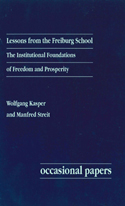
West Germany’s post-war economic success was based on the ideas of the ‘Freiburg School,’ a school of liberal economists, lawyers and social philosophers centred at Freiburg University. The failure of the Weimar Republic and the rise of National Socialism convinced them that majority rule and reliance on a benign ‘spontaneous’ order alone would not guarantee a durable free order. They argued that the state, through the law, should maintain and defend basic institutions such as property rights, free competition, stable money and individual responsibility. The Freiburg School put more faith than British, American and Australian liberals in constitutional law to safeguard basic freedom and in well-designed government institutions to create a durable framework for a free and prospering society.
Although the influence of the Freiburg school waned after the mid-1960s, Germany still has some resilient institutions based on Freiburg liberalism. The durability and effectiveness of any future reform in Australia and New Zealand would benefit from an acquaintance with the Freiburg school of thought.











